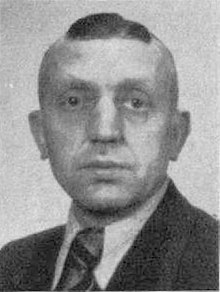Franz Land
Franz Land (born February 16, 1896 in Langendreer as Franz Krajewski ; † between October 10 and 14, 1974 in the Dortmund district of Mengede ) was a German politician ( NSDAP ).
Live and act
After attending elementary school , Franz Krajewski earned his living as a miner. From 1915 to 1917 Franz Krajewski took part in the First World War with the Grand Ducal Mecklenburg Reserve Jäger Battalion 14 . In the war in which he fought on the Western Front , he was seriously injured and was awarded the Iron Cross II. Class and the Cross of Honor for Frontline Fighters .
In the post-war period, Krajewski was temporarily a member of the Baltic Landwehr . In 1919 Krajewski in Mengede first joined the SPD and a little later the anarcho-syndicalist trade union FAUD and took part in the Dortmund hunger riots on July 2, 1919, forcing several tobacco traders to sell their stocks at heavily discounted prices shortly afterwards he was sentenced to three months' imprisonment. During the Kapp Putsch , Krajewski was part of the local action committee in Mengede, which organized resistance against the putsch on the spot. a. Arms for the Red Ruhr Army . Krajewski left FAUD at the end of 1920.
Krajewski made contact with the NSDAP in mid-1921 and in 1922 he participated in the founding of one of the first NSDAP groups outside of Bavaria, the local NSDAP group in Dortmund-Mengede, which he later took over. In 1923 he took part in the fight against the French occupation forces in the Ruhr area . In 1924 he changed his family name to Land together with his brother Paul Krajewski , who was also one of the leading local NSDAP members .
From 1932 until the dissolution of this body in autumn 1933, Land belonged to the Prussian state parliament . He then sat from November 1933 until the end of the Nazi regime in the spring of 1945 as a member of the National Socialist Reichstag , in which he represented constituency 18 ( Westphalia South).
literature
- Andreas Müller: Departure into new times. Anarchosyndicalists and National Socialists in Mengede in the early phase of the Weimar Republic , in Archive for the History of Resistance and Work (AGWA), 8 (1987), pp. 121–154.
- Joachim Lilla , Martin Döring, Andreas Schulz: extras in uniform. The members of the Reichstag 1933–1945. A biographical manual. Including the ethnic and National Socialist members of the Reichstag from May 1924. Droste, Düsseldorf 2004, ISBN 3-7700-5254-4 .
- Erich Stockhorst : 5000 people. Who was what in the 3rd Reich . 2nd Edition. Arndt, Kiel 2000, ISBN 3-88741-116-1 .
Individual evidence
- ↑ Andreas Müller: Departure into new times. Anarchosyndicalists and National Socialists in Mengede in the early phase of the Weimar Republic. Syndicate A Medienvertrieb in AGWA 8 (1987), pages 121-154.
- ↑ Michael Kubina : From Utopia, Resistance and Cold War: The untimely life of the Berlin councilor communist Alfred Weiland (1906-1978). , Volume 1 of Dictatorship and Resistance. LIT Verlag Münster, 2001, ISBN 3825853616 , page 76.
- ↑ Andreas Müller: Departure into new times. Anarchosyndicalists and National Socialists in Mengede in the early phase of the Weimar Republic. Syndicate A Medienvertrieb in AGWA 8 (1987), pages 121-154.
Web links
- Franz Land in the database of members of the Reichstag
| personal data | |
|---|---|
| SURNAME | Country, Franz |
| ALTERNATIVE NAMES | Krajewski, Franz (until 1924) |
| BRIEF DESCRIPTION | German politician (NSDAP), MdR, MdL |
| DATE OF BIRTH | February 16, 1896 |
| PLACE OF BIRTH | Langendreer |
| DATE OF DEATH | between October 10, 1974 and October 14, 1974 |
| Place of death | Amount of money |
